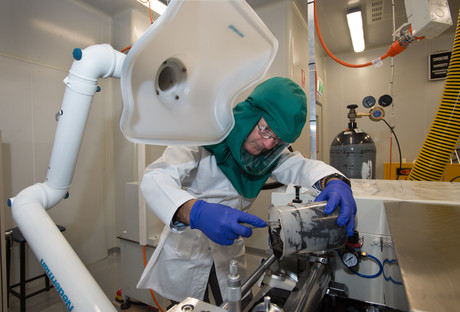QUT creates lithium-ion battery pilot facility

Queensland University of Technology (QUT) has developed Australia’s first pilot facility to produce commercial-grade lithium-ion batteries. The facility is built within QUT’s pilot plant precinct at Banyo on Brisbane’s northside.
Professor Peter Talbot from QUT’s Institute for Future Environments said the batteries were based on commercial battery formats comparable to those used to power Tesla vehicles.
“Importantly, as part of this project we identified the best lithium-based powders to use to create a battery of the highest energy-efficiency standards possible,” he said. “The powder is a combination of lithium and other compounds. We tested various compositions of chemicals until we were satisfied that we had achieved the best powder possible.
“Our process enables us to rapidly test and prototype rechargeable lithium-ion batteries of various shapes and sizes.”
He said the research could be used to kickstart a commercial lithium-ion battery manufacturing industry in Australia, with the batteries being one of the most popular types of rechargeable batteries used in portable electronics, from mobile phones to power tools and drones.
“This process could be automated to enable Australia to have a competitive advantage in a manufacturing space that is currently dominated by China,” he said. “As the middle class in the ASEAN region grows, so too will the demand for lithium-ion battery-operated goods.
“As more and more vehicles in the future are manufactured to run on battery power, the development of longer-lasting batteries will be crucial to a vehicle’s overall efficiency and appeal to consumers.”
Lithium is mined in several countries including Australia, and Professor Talbot said the facility could value-add to the mining industry as miners could have their materials validated at the plant. Talbot said the technology and processes developed at QUT as part of the project were suitable for use by any commercial battery manufacturing company.
He said now that QUT had developed the purpose-built facilities needed to build the lithium-ion batteries, the university could develop batteries for specific commercial applications.
“We will be able to purpose build the most efficient batteries possible to power any number of devices and products, including some of QUT’s advanced robots.”
Infrastructure built at QUT’s Banyo facility to facilitate the project includes Australia’s only electromanufacturing room with low humidity. The Australia-first battery is the outcome of a three-year $4 million project, funded by the Auto Cooperative Research Centre and conducted in conjunction with the Malaysia Automotive Institute.
“This research wouldn’t have been possible without the financial backing of the Australian and Malaysian governments and highlights the importance of international research partnerships in the efforts to solve global problems,” Talbot said.
Mars Wrigley to boost Asquith factory with new production line
Mars Wrigley Australia is installing a new production line at its Asquith factory to boost...
Welding body calls for a nation-building approach to combat Trump's tariffs
Weld Australia believes that US tariffs offer Australia a unique opportunity to carve out a new...
New free TAFE courses aim to develop manufacturing skills
The NSW Government has announced four new free TAFE courses designed to upskill Australians and...








